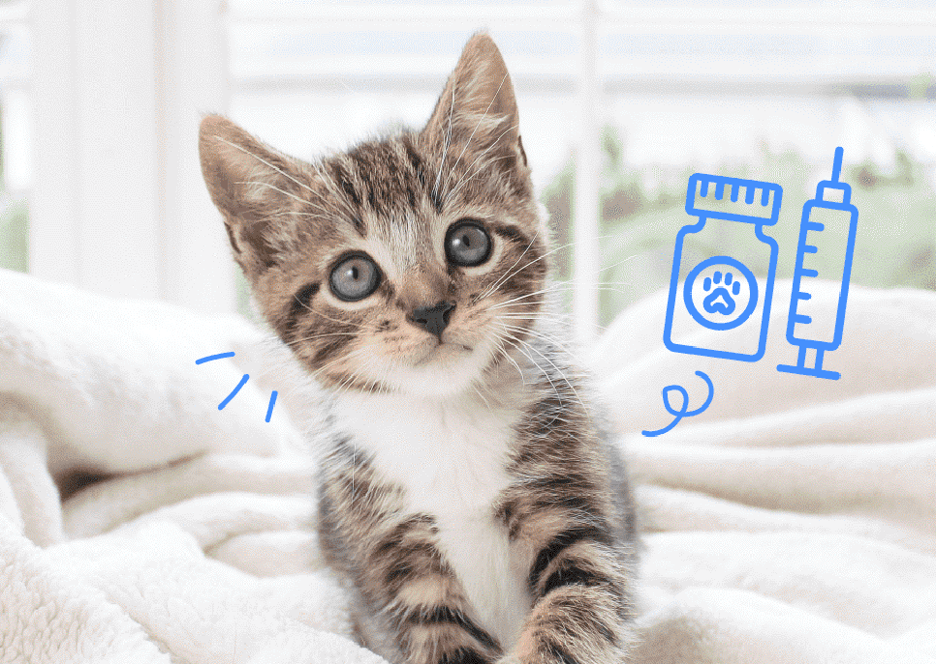ARTICLE
First-Year Kitten Vaccination Guide
페이지 정보
본문
Although most cats are indoors, there are still diseases that affect many indoor and outdoor cats every year. It is essential for your kitten to receive its core vaccines to ensure they live a long and healthy life. There are two types of vaccinations kittens get: Core and Non-Core Vaccines.
This article will go over the vaccination schedule, what each vaccination is for, its costs, and some commonly asked questions.
Check the vaccination guideline below and keep your cat’s vaccinations up to date so that our best friends stay healthy for longer!
Core Vaccination Guideline ✔
- At 6-8 weeks: FVRCP, FeLV*
- At 10-12 weeks: FVRCP, FeLV*
- At 14-16 weeks: FVRCP, Rabies, FeLV*
- A year after week 14-16: Rabies
- Every 1-3 years: FVRCP, Rabies, FeLV
*FeLV is considered a noncore vaccine for adult cats but is highly recommended for a kitten's first year of vaccination
Source: PetMD, https://www.petmd.com/cat/infographic/basic-vaccine-schedule-cats
Q. What are Core Vaccines?
Core vaccines are vaccines that all kittens should receive to protect them from preventable threats to their health. Core vaccines recommended by the AAFP (American Association of Fine Practices) include FVR, FCV, FPV and Rabies Vaccines. The repercussions of not receiving these core vaccines can lead to a risk of developing fatal diseases in a cat. So it is recommended that cats receive their vaccinations at the right time. For cats, vaccination guidelines typically start between 6-8 weeks. Then the AAFP(The American Association of Feline Practices) recommends all cats to be continually vaccinated with Core Vaccines every 3-4 weeks from the first immunization until they reach 16-20 weeks.
Q. What is the FVRCP vaccine?
The FVRCP vaccine is a highly effective vaccine that protects against more than one disease in cats, similar to the DHPP vaccine for dogs. The FVRCP is considered a core vaccine due to its success rate in preventing these three deadly feline diseases: FVR (Feline Viral Rhinotracheitis), FCV (Feline Calicivirus), and FPV (Feline Panleukopenia).
- FVR or FHV-1 is a highly contagious virus nicknamed cat cold because of its similar symptoms such as sneezing, runny nose, and conjunctivitis. These symptoms can increase rapidly if a cat's immune system is relatively weak, like cats under stress. This spike in symptoms could prompt a secondary bacterial infection and prove fatal if not treated properly.
- FCV is another highly contagious virus that attacks the upper respiratory system. Its main symptoms include but are not limited to inflammation of the cat's respiratory system, sneezing, congestion, runny nose, and conjunctivitis. If symptoms worsen, severe respiratory infections can occur.
- FPV is a terrifying disease that is highly contagious and has a high mortality rate. It mainly causes anorexia, vomiting, fever, and severe diarrhea in cats. FPV also attacks the cats' bone marrow and lymph nodes, causing deficient white blood cell levels that usually help them activate their immune systems.
Q. What is Rabies and why is it required by law in most states?
Rabies is a dangerous and preventable disease transmitted through a bite and even transmittable to humans. Cats are still prone to infection from contact with other animals or even objects brought into the home. To prevent the spread of this fatal disease to all animals, several states have made it a requirement. Cats should begin their rabies vaccine process at the earliest 14 weeks, one year after the initial shot, and then every 3 years.
Q. What are noncore vaccines?
Noncore vaccines are optional vaccines that should be considered based on the risk of exposure: where you live and your cat's lifestyle. Noncore vaccines recommended by the AAFP (American Association of Fine Practices) include FeLV, Chlamydia Felis, and Bordetella Bronchiseptica vaccines. We recommend sufficient consultation with a veterinarian before inoculating cats with any noncore vaccines. This step ensures that the vaccine and the timing suit your cat’s health condition.
- FeLV(Feline Leukemia Virus), otherwise known as retrovirus, causes symptoms similar to those of Leukemia patients, so it was named Feline Leukemia. This disease inhibits the cat's immune system, which causes inflammation to all of a cat's internal organs and can cause reproductive problems.
- Chlamydia Felis is a highly contagious bacterial disease that mainly affects the eyes and the respiratory tract. In this disease, symptoms include conjunctivitis, inflammation, and sneezing. In the most severe cases, this disease allows causative bacteria to live in a cats’ reproductive organs. With Buddydoc and a local veterinarian, this bacterial pathogen is treatable with a low risk of recurrence.
- Bordetella Bronchiseptica is also a highly contagious bacterial disease. When kittens contract Bordetella Bronchiseptica, they will exhibit a few minor symptoms that can last up to 10 days. The most common symptoms include sneezing, fever, and respiratory problems.
Q. How much do the vaccines cost?
All core vaccines cost on average $40-80
Rabies vaccine costs on average $15-$20
Noncore vaccines cost ranges from $10-$50
Some clinics do provide a package price that includes several vaccines or other medical procedures beneficial for your cat.
Q. What should I do after my cat gets fully vaccinated?
Your cat will take some time for their immune system to respond to the vaccine. We recommend providing a warm and comfortable place to rest with easy access to food and water. If your cat shows abnormal symptoms such as refusal to eat, hives, vomiting, or diarrhea, contact your veterinarian immediately.
Q. When can my kitten go outside?
It is recommended to keep your kitten indoors until at least a week after it has finished its initial course of vaccinations, this can be from 13 to 17 weeks old. Allowing your kitten to explore outside before this period can introduce potential infection and diseases.
Q. What if I miss the window for vaccination?
If the window for vaccination is missed by 2 weeks or more, the cat’s immune system may no longer respond to the subsequent shot. This mistake can also cause the immune response to respond less for the next scheduled vaccination shot. Practices may differ from vet to vet, but your kitten may need an extra vaccination to boost its immunity.
If you are ever worried about missing the window for vaccination for your cat.
The Buddydoc app has a diary and calendar feature that keeps you updated with your cats' vaccination appointments and more.
With Buddydoc, we assure the healthiest and best start in life for your cat! ⋆*













